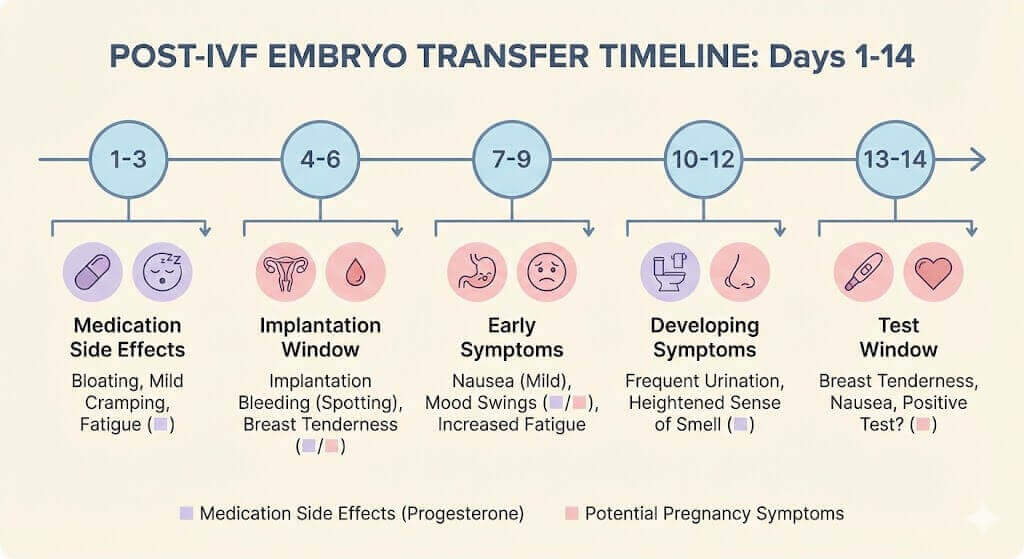Pregnancy Symptoms After IVF: What to Expect
Pregnancy symptoms after IVF treatment can be similar to natural conception, but some may be masked by fertility medications. Understanding what to expect helps you navigate this exciting time with confidence and reduces anxiety during the crucial two-week wait.
Early Pregnancy Signs After IVF
Following successful embryo implantation, you may experience various early pregnancy signs. These symptoms typically begin 1-2 weeks after embryo transfer and can vary significantly between individuals.
Most Common Early Symptoms:
- Missed Period: The most reliable early sign, especially if your cycle was regular before IVF
- Breast Tenderness: Increased sensitivity, swelling, or tingling sensations
- Fatigue: Overwhelming tiredness, even with adequate rest
- Nausea and Morning Sickness: Can occur at any time of day, not just mornings
- Frequent Urination: Increased trips to the bathroom due to hormonal changes
- Mood Swings: Emotional changes due to fluctuating hormone levels
- Food Aversions or Cravings: Sudden changes in taste preferences
- Bloating and Constipation: Digestive changes due to progesterone
Timeline of Pregnancy Symptoms After IVF
Understanding when symptoms typically appear can help you manage expectations and reduce anxiety during the two-week wait.

Week 1-2 After Transfer:
- Days 1-3: Usually no symptoms, embryo is implanting
- Days 4-7: Possible light spotting (implantation bleeding)
- Days 8-14: Early symptoms may begin to appear
Week 3-4 After Transfer:
- Pregnancy Test Positive: Usually around day 10-14
- Symptoms Intensify: Nausea, fatigue, breast tenderness increase
- Hormonal Changes: Progesterone and hCG levels rise significantly
Distinguishing Between Medication and Pregnancy Symptoms
One of the biggest challenges after IVF is distinguishing between medication side effects and actual pregnancy symptoms. Many fertility medications can cause symptoms similar to early pregnancy.
Medication Side Effects vs. Pregnancy Symptoms:
- Progesterone Supplements: Can cause fatigue, breast tenderness, mood swings
- Estrogen Medications: May cause bloating, nausea, and breast changes
- hCG Trigger Shots: Can cause pregnancy-like symptoms for 7-10 days
- Fertility Medications: May mask or mimic early pregnancy signs
What's Normal vs. When to Seek Help
While most pregnancy symptoms are normal, some require immediate medical attention.
Normal Symptoms Include:
- Mild to moderate nausea and vomiting
- Breast tenderness and swelling
- Fatigue and mood changes
- Food aversions and cravings
- Frequent urination
- Light spotting (implantation bleeding)
Seek Immediate Medical Attention For:
- Severe Abdominal Pain: Could indicate ectopic pregnancy
- Heavy Bleeding: More than light spotting
- Severe Nausea/Vomiting: Unable to keep fluids down
- Dizziness or Fainting: May indicate blood pressure issues
- Severe Headaches: Could be related to blood pressure
- Fever or Chills: May indicate infection
Managing Pregnancy Symptoms After IVF
Effective symptom management can improve your comfort and reduce anxiety during early pregnancy.
For Nausea and Morning Sickness:
- Eat small, frequent meals throughout the day
- Stay hydrated with water, ginger tea, or electrolyte drinks
- Avoid strong smells and foods that trigger nausea
- Consider vitamin B6 supplements (with doctor approval)
- Try acupressure wristbands
For Fatigue:
- Get adequate sleep (8-9 hours per night)
- Take short naps during the day if needed
- Maintain a balanced diet with iron-rich foods
- Stay hydrated and avoid caffeine in excess
- Light exercise like walking can help boost energy
For Breast Tenderness:
- Wear supportive, comfortable bras
- Avoid underwire bras that may cause discomfort
- Apply warm or cool compresses as needed
- Use gentle, fragrance-free soaps
Emotional and Psychological Aspects
Pregnancy after IVF can bring unique emotional challenges. Many women experience anxiety about symptom interpretation and pregnancy viability.
Common Emotional Responses:
- Anxiety About Symptoms: Constantly analyzing every bodily change
- Fear of Loss: Worry about miscarriage after successful IVF
- Guilt or Shame: Feeling different from "natural" pregnancies
- Excitement Mixed with Caution: Hesitant to fully embrace pregnancy
Coping Strategies:
- Join IVF pregnancy support groups
- Practice mindfulness and relaxation techniques
- Maintain open communication with your partner
- Seek professional counseling if needed
- Focus on self-care and stress reduction
Monitoring Your Progress
Regular monitoring helps ensure a healthy pregnancy and provides reassurance during the early weeks.
Key Monitoring Points:
- Blood Tests: hCG levels, progesterone, estrogen
- Ultrasound Scans: Confirm pregnancy location and viability
- Symptom Tracking: Keep a journal of symptoms and concerns
- Weight Monitoring: Healthy weight gain patterns
- Blood Pressure: Regular monitoring for preeclampsia risk
When to Take a Pregnancy Test
Timing your pregnancy test correctly is crucial for accurate results and emotional well-being.
Recommended Testing Schedule:
- Day 9-10: Early testing possible with sensitive tests
- Day 12-14: Most reliable time for accurate results
- Blood Test: More accurate than urine tests
- Follow-up Testing: May be needed to confirm rising hCG levels
Preparing for the Next Steps
Once pregnancy is confirmed, there are important steps to take for a healthy pregnancy journey.
Immediate Next Steps:
- Continue prescribed medications as directed
- Schedule your first prenatal appointment
- Begin taking prenatal vitamins if not already
- Discuss any concerns with your fertility specialist
- Plan for the transition to obstetric care
Conclusion
Pregnancy symptoms after IVF can be both exciting and anxiety-provoking. Remember that every pregnancy is unique, and symptoms vary widely between individuals. Stay in close communication with your healthcare team, trust your instincts, and don't hesitate to seek support when needed. Your journey to parenthood is valid and worthy of celebration, regardless of how it began.
Remember: If you have any concerns about your symptoms or pregnancy progress, always consult with your healthcare provider. They are there to support you through every step of this incredible journey.